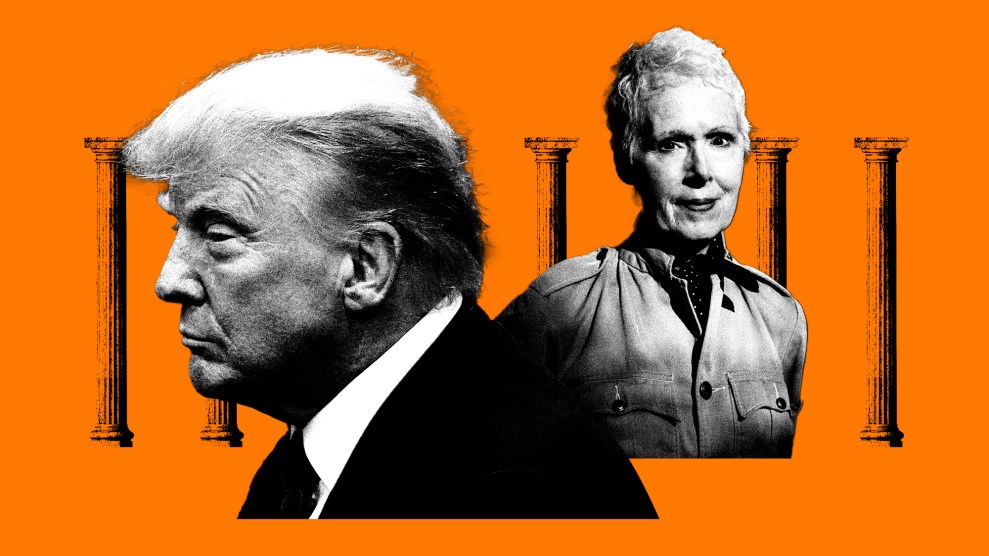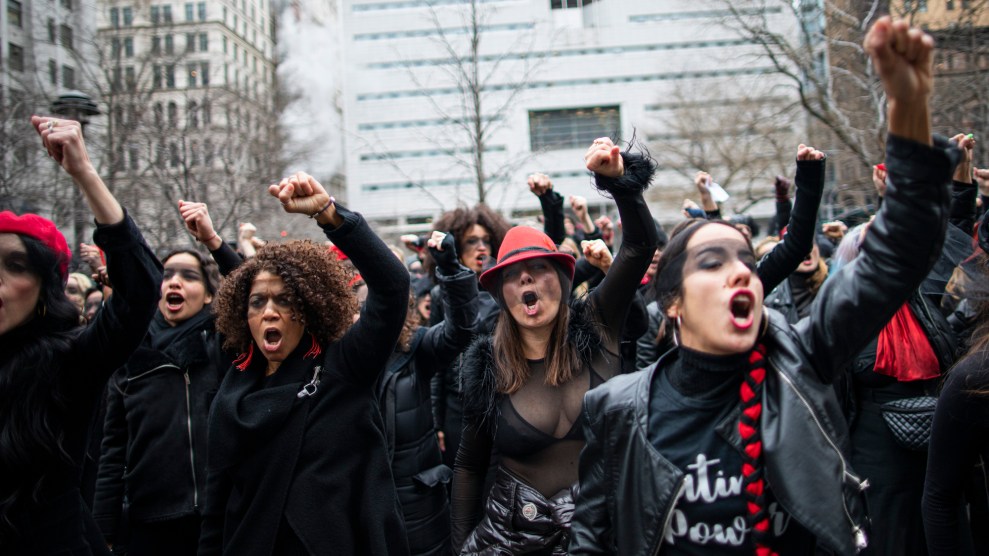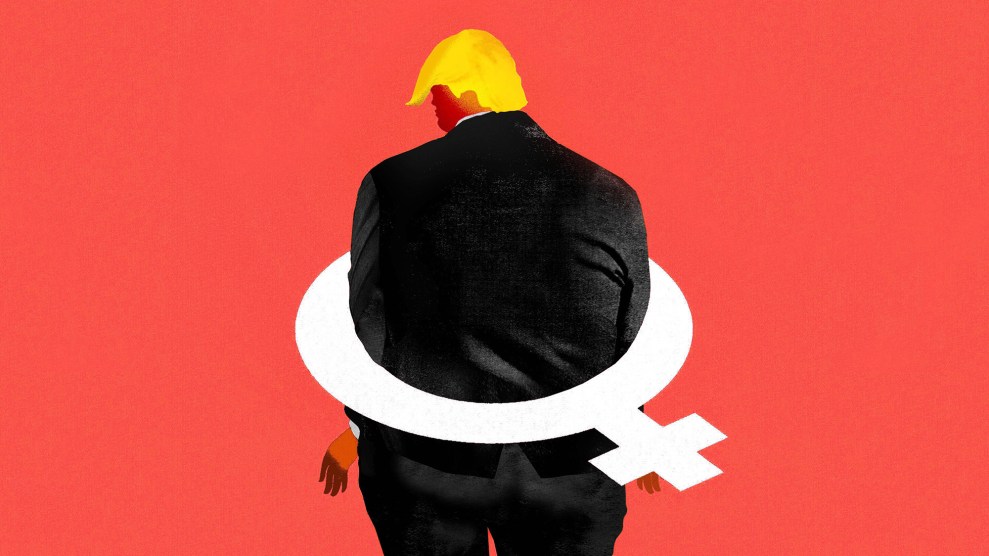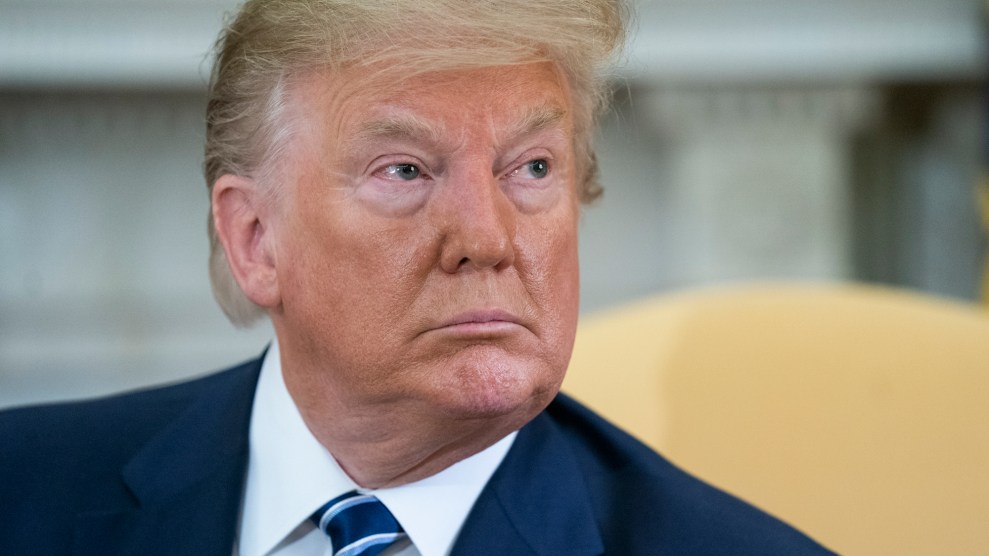
Mother Jones; Seth Wenig/AP; Eva Deitch/The Washington Post/Getty
Six and a half years ago, the tape that should have ended his political career was published by the Washington Post, and Donald Trump survived it. “I just start kissing them. It’s like a magnet. Just kiss. I don’t even wait,” Trump famously told Billy Bush, his words caught by a hot mic as the men leered out a bus window at a soap opera actress. “And when you’re a star, they let you do it,” Trump said. “You can do anything.”
“Whatever you want,” Bush said.
“Grab them by the pussy. You can do anything,” Trump said.
When Trump, onstage at a presidential debate two days later, said he had never kissed or groped any woman without consent, his denial opened the floodgates: Within weeks, more than a dozen women had come forward forward with stories of Trump sexually assaulting them. But the barrage of allegations—which were not the first such claims against Trump—seemed to simply bounce off the real estate magnate as he barreled his way to the presidency. In the years since, despite multiple lawsuits, Trump has never had to face trial over any of the allegations.
That changes today.
This morning, in a downtown Manhattan courthouse, lawyers will select anonymous jurors to decide an explosive, high-profile lawsuit filed against Trump by E. Jean Carroll, a writer and advice columnist who says he raped her in a department store dressing room in the mid-90s. Carroll first sued Trump in 2019, a few months after she raised allegations amounting to a claim of first-degree rape in a book excerpt published by New York magazine. “The moment the dressing-room door is closed, [Trump] lunges at me, pushes me against the wall, hitting my head quite badly, and puts his mouth against my lips,” Carroll wrote. “He seizes both my arms and pushes me up against the wall a second time, and, as I become aware of how large he is, he holds me against the wall with his shoulder and jams his hand under my coat dress and pulls down my tights.”
She continued: “The next moment, still wearing correct business attire, shirt, tie, suit jacket, overcoat, he opens the overcoat, unzips his pants, and, forcing his fingers around my private area, thrusts his penis halfway—or completely, I’m not certain—inside me.”
Trump immediately and repeatedly denied the allegations. He’s called her a “liar” and “mentally sick,” claiming she made up her story to sell books. He’s also said that he’s never met Carroll (a 1987 photograph shows them together), and that she was “not his type” (when presented with the aforementioned photograph during a deposition, Trump confused her for his ex-wife, Marla Maples).
While Carroll did not make a police report in the 1990s, and the statute of limitations on any criminal case has since expired, her 2019 lawsuit accused the then-president of defamation, arguing that he falsely smeared her when he called her a liar. That case dragged on for years as Trump pursued almost every possible appeal and delay, trying to get the Department of Justice to defend him, and otherwise shielding himself using the trappings of the presidency. Then Carroll sued him again in November 2022, using a newly passed New York State law that opened a one-year “lookback window” for adult survivors of sexual assault to file lawsuits against alleged perpetrators or institutions that enabled abuse.
It’s that second lawsuit—alleging both battery and defamation—that goes to trial today. But it’s not just Carroll’s story that will be presented to the anonymous jury. Two women who came forward after Trump’s debate denial will also get to testify, US District Court Judge Lewis Kaplan ruled earlier this spring. One of the women, Jessica Leeds, told the New York Times that Trump kissed her and groped her without consent while sitting next to her on an airplane three decades earlier. The other, former People magazine reporter Natasha Stoynoff, wrote about Trump kissing and groping her without consent in 2005, when she was visiting Mar-a-Lago to write a profile about his and Melania’s first wedding anniversary.
No DNA evidence will be presented or even discussed at trial, despite much prior speculation about the possibility that Trump left genetic material on a dress that Carroll said she’d kept, unwashed, since the alleged encounter. According to Carroll’s legal team, testing reportedly discovered male DNA on the dress. But because Trump did not submit to DNA testing that could have been compared to the sample, even mentioning the possibility of such evidence could taint the jury, Judge Kaplan ruled in March.
It’s not clear yet whether Trump will actually face any of his accusers in person. His lawyer informed the judge last week that the former president had not yet decided whether to appear at the courthouse (he isn’t legally required to). The trial is unfolding at a particularly dire moment for Trump, who pleaded not guilty earlier this month on 34 felony counts of falsifying business records and faces other possible indictments in Washington and Georgia. Earlier this month, Trump tried to delay the trial in Carroll’s case yet again, arguing that potential jurors needed a “cooling off period” amid all the news of his legal woes.
“At least some portion of the recent media coverage of Mr. Trump’s indictment was of his own doing,” Judge Kaplan wrote in response, denying the delay request.













